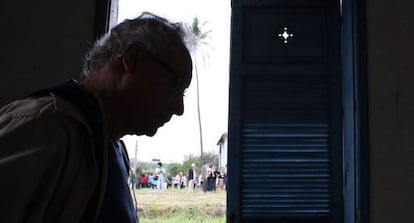Report says Brazil’s dictatorship was responsible for 421 deaths
National Truth Commission publishes first official data on regime’s human rights violations

Almost 30 years after Brazil’s military dictatorship ended, the National Truth Commission (CNV) has published its first official figures relating to human rights violations – deaths and disappearances – committed under the regime. The commission, which will present its full report on December 10, says the military was responsible for the murder and disappearance of 421 people who opposed the regime that governed the country between 1964 and 1985.
The list of victims could be longer given that, according to the commission, the armed forces barely collaborated with its investigations. In May 2012, before the investigations began, CNV members estimated the number of victims to be between 350 and 370. In comparison, Chile’s dictatorship (1973-1989) was responsible for 3,065 deaths and disappearances and 30,000 cases have been attributed to Argentina’s junta (1976-1983).
The fate of 208 missing persons, 70 of whom were members of Araguaia Guerrilla, remains unknown
Brazilian authorities had already found 181 corpses before creating the commission. In the last few years, relatives of victims together with the police, the Public Prosecutor’s Office and others helped uncover 31 more bodies, while the commission’s work has led to the recovery of one further corpse. Still, the fate of 208 missing persons, 70 of whom were members of Araguaia Guerrilla, one of the largest movements against the dictatorship, remains unknown.
In two years of investigation, the commission discovered former torture houses used by the regime and collected proof of civilian collaboration with the military. In one report the organization notes that about 80 businesses collaborated with the regime by spying on workers and union leaders, including multinational groups such as Volkswagen, Chrysler, Ford, General Motors, Toyota, Rolls-Royce, Mercedes-Benz and Brazilian companies Petrobras and Embraer.
The identification of the dead and missing persons does not imply any punishment for those who were involved. The 1979 Amnesty Law pardoned crimes committed under the dictatorship, freed more than 25,000 political prisoners, and guaranteed that military personnel and their supporters would not face trial. In principle, the final CNV report will be an official document stating that the Brazilian government committed acts that violated human rights and crimes against its own citizens.
Translation: Dyane Jean François
Tu suscripción se está usando en otro dispositivo
¿Quieres añadir otro usuario a tu suscripción?
Si continúas leyendo en este dispositivo, no se podrá leer en el otro.
FlechaTu suscripción se está usando en otro dispositivo y solo puedes acceder a EL PAÍS desde un dispositivo a la vez.
Si quieres compartir tu cuenta, cambia tu suscripción a la modalidad Premium, así podrás añadir otro usuario. Cada uno accederá con su propia cuenta de email, lo que os permitirá personalizar vuestra experiencia en EL PAÍS.
¿Tienes una suscripción de empresa? Accede aquí para contratar más cuentas.
En el caso de no saber quién está usando tu cuenta, te recomendamos cambiar tu contraseña aquí.
Si decides continuar compartiendo tu cuenta, este mensaje se mostrará en tu dispositivo y en el de la otra persona que está usando tu cuenta de forma indefinida, afectando a tu experiencia de lectura. Puedes consultar aquí los términos y condiciones de la suscripción digital.








































